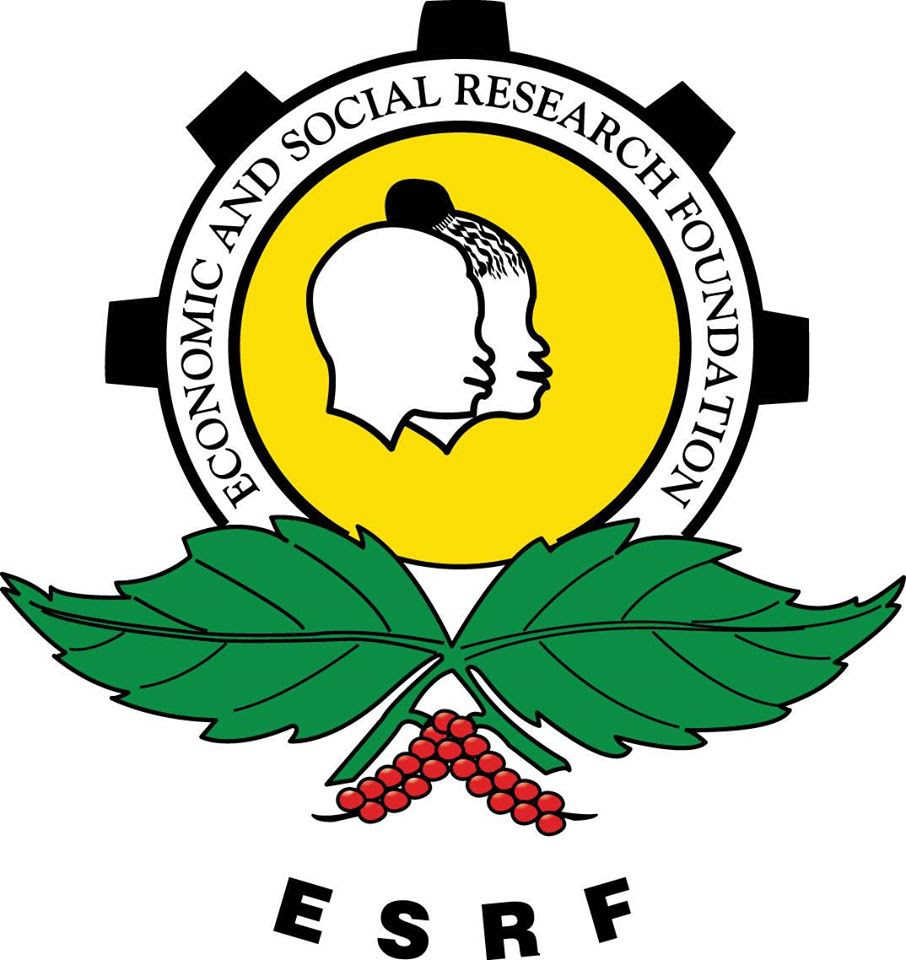
Strategic Research
Strategic Research and Publications Department (SRPD) undertakes supply driven policy research and analysis to increase stakeholders’ knowledge through generation of research evidence, which forms a major input to economic, social and other policy making processes in the country.
ESRF research agenda is therefore shaped by the evolving economic policies, the dynamics of political governance and the emerging social economic challenges emanating from the changing economic environment in Tanzania, the EAC, SADC, AU and worldwide.
The Department is also dictated by emerging global issues that have increased the need for research-based evidence. The annual work plans for the SRPD are geared towards carrying out rigorous and policy-oriented research that generates new insights and options for promoting policies that facilitate inclusive growth. The work of SRPD aligns well with the strategic research themes under each strategic plan of the Foundation.
Ongoing Projects
Everyday Credit: A Situation Analysis of the Evolving Financial Landscape in Tanzania
The Economic and Social Research Foundation (ESRF) is conducting a situation analysis to map the evolving financial landscape of credit and lending in Tanzania. This study focuses on credit systems operating outside formal commercial banks, encompassing digital lenders, microfinance institutions, and informal credit providers
Background
Access to diverse forms of credit has become vital for Tanzanians to manage everyday expenses, invest in small businesses, and improve their livelihoods. Over the past 15 years, the credit landscape has expanded significantly, with providers ranging from banks and mobile money operators to microfinance entities and informal lenders. While prior studies have focused on specific credit types or institutions, this research aims to comprehensively examine the interplay, operations, and user behaviors across the entire spectrum of non-bank credit providers.
Objectives of the Study
This study seeks to:
- Identify and map the variety of credit providers operating in Tanzania, including their operational models and user demographics.
- Explore delivery mechanisms, such as group lending, mobile money platforms, and other innovative approaches.
- Analyze the interactions among different credit providers and their contributions to livelihood strategies, including self-build housing initiatives.
Methodology
The study employs a qualitative research design comprising:
- Literature Review: Analyzing academic, government, and industry reports to understand the financial landscape.
- Key Informant Interviews: Engaging with stakeholders, including representatives from microfinance institutions, digital lenders, informal credit groups, and regulatory bodies like the Bank of Tanzania.
- Field Research: Investigating informal credit systems such as VICOBA, market traders’ credit arrangements, and self-organized lending initiatives.
Expected Outputs
The study will deliver:
- A comprehensive report detailing the diversity and evolution of credit systems, including their regulatory impacts and user experiences.
- Insights into the operational frameworks and risk management strategies of credit providers, including digital and informal lenders.
- Recommendations to enhance financial inclusion and support economic growth, particularly for underserved communities.
Collaboration and Funding
The research is part of the broader project, Home-Grown Growth in African Cities: How Self-Build Housing Drives Urban and Economic Growth in Ghana and Tanzania, funded by the UK’s Economic and Social Research Council (ESRC). t is housed at LSE’s Department of Geography and Environment, leveraging interdisciplinary expertise to examine critical aspects of urban development and finance.
Through this analysis, ESRF contributes to advancing knowledge on Tanzania’s evolving financial systems and their role in fostering inclusive economic growth.
Qualitative Research on Changes in Prevalence Between Tanzania’s Violence Against Children & Youth Surveys (VACS)
The Economic and Social Research Foundation (ESRF), in partnership with Together for Girls (TfG), is conducting a qualitative study to examine changes in the prevalence of Violence Against Children (VAC) in Tanzania between the 2009 and 2024 Violence Against Children and Youth Surveys (VACS). This initiative, supported by TfG, aims to identify the impact of policy shifts, programmatic interventions, and societal changes over the past 15 years, with a special focus on adolescent girls and education-related factors.
Background
Together for Girls is a global partnership dedicated to ending violence against children, with a focus on sexual violence against girls. Tanzania, as one of the first countries to conduct VACS in 2009, provided a foundation for policies and interventions to combat VAC. The subsequent survey in 2024 offers an opportunity to assess progress and challenges through a comparative lens.
Objectives of the Study
The study seeks to:
- Analyze significant policy, legal, and programmatic changes since 2009.
- Examine social and cultural drivers influencing VAC prevalence, especially for adolescent girls.
- Assess the role of education policies in creating safe learning environments.
- Identify gaps in VAC prevention and response frameworks.
- Provide evidence-based recommendations for strengthening VAC prevention efforts.
Methodology
ESRF will employ a multi-phase qualitative research approach, including:
- Desk reviews of relevant policies and programs.
- Key informant interviews with stakeholders from government, civil society, education, and health sectors.
- Thematic analysis of collected data to identify trends and gaps.
Expected Outcomes
The study aims to deliver:
- A detailed report highlighting factors driving changes in VAC prevalence and actionable recommendations.
- Policy briefs for stakeholders.
- Enhanced evidence for guiding future policy and program interventions.
Funding and Collaboration
The study is funded by Together for Girls and involves close collaboration with national stakeholders, including the Government of Tanzania, UNICEF, and the U.S. Centers for Disease Control and Prevention (CDC). It complements ongoing efforts to implement Tanzania’s National Action Plan to End Violence Against Women and Children.
This research underscores ESRF’s commitment to fostering evidence-based solutions to enhance child protection and aligns with its strategic focus on social services, governance, and gender equality.
Scaling up innovations for reducing and redistributing women's and girls' unpaid care work in rural Tanzania
In partnership with WSP, REDESO with co-funded by Global Affairs Canada and IDRC
The aim of the project is to reduce and redistribute unpaid care work for women by increasing the number of women benefiting from a tested rainwater harvesting innovation in the Kishapu district, as well as the availability of water per person, and the duration of water availability during the dry season. Availability of water intends to reduce the time spent on fetching water from a distance of about 20 to 30 kilometres. The saved time has to be invested in income generating activities by women.
To provide income-generating opportunities for women and girls, the project will also provide entrepreneurship, business management and formal job acquisition training. Further, it will address the cultural norms that assign the burden of unpaid care work to women and girls and thereby exclude them from labor market opportunities.
Timeframe: 2024 to 2027
Scaling up innovations for Reducing and Redistributing Women and Girls unpaid care work in Rural Tanzania: case of Kishapu District, Shinyanga Region
Baseline Findings
The project aims at addressing heavy burden of unpaid care work (UCW) on women and girls in rural Tanzania, specifically in Kishapu District, Shinyanga Region. This is because UCW, such as fetching water and caring for family members, is
often invisible in social and economic policies, yet hinders women and girls’ opportunities for paid work, education, and political participation. The three-year project is supported by the IDRC under the Scaling Care Innovations in Africa
initiative and involves three institutions: ESRF, REDESO, and WSP. It focuses on promoting gender equality by reducing and redistributing UCW through innovative rainwater harvesting technology; entrepreneurial training; and social norms
change.
Its key objectives include:
- Increasing adoption of rainwater harvesting technologies
- Enhancing entrepreneurship and labor market skills among women and girls
- Addressing social gender norms (SGNs) that assign UCW to women
- Enhance uptake for policy purposes and upscaling of research outputs
Government agencies, cultural leaders, civil society organizations, and the private sector, are involved to ensure research evidence informs public policy and development plans. Qualitative and quantitative research approach through 484 household surveys, 20 FGDs, and 68 KIIs was used. Findings indicate that during dry season, 70.0% of the households rely on rivers and streams; only
0.6% use rainwater.
Water availability for majority (90.9%) is challenging during dry season due to unreliable water sources, long distances to water points, extended waiting times and queues, river drying, high costs, and poor water quality. In most households, mothers are responsible for fetching water (33.0%), followed by sons (29.8%), daughters (17.9%), and then fathers (17.2%). During the dry season, most households (22.3%) travel 10-15 km to fetch water, while others cover 5-10 km (21.7%), 15-20 km (12.6%), and even more than 20 km (2.7%). Only 24.0% of women own business, while 84% have not received any entrepreneurship training.
Other factors attributing to limited business ownership include household responsibilities, and insufficient capital. Women are responsible for household’s chores including fetching water (56.4%), and environmental maintenance (50.9%), while men are
responsible for organizing household responsibilities (71.6%), managing family income (57.3%), and ensuring household needs are met (48.1%). Due to this, most decisions are dictated by fathers.
The project focuses on shifting these norms by promoting greater involvement of men in care work and using Bandebereho innovative model. The study recommends recognizing value of UCW in national policies, investing in public services that reduce women’s care workload, and promoting equitable redistribution of UCW through community involvement. Ultimately, the project aims to empower women and girls economically and socially by reducing time poverty, increasing their access to paid work, and improving gender equality. It advocates for policy reforms, and ensuring public services like water supply, sanitation, and education are accessible to reduce time women spend on unpaid labor. The study emphasizes the need for long-term sustainability by engaging all stakeholders in planning and implementation of gender-responsive policies and interventions.
Evidence through the photos
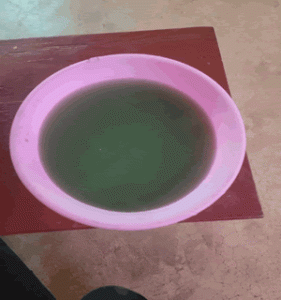 |
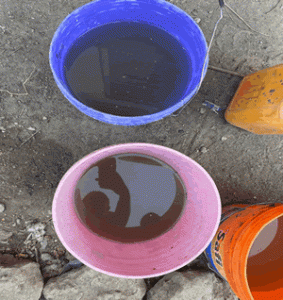 |
| A sample of actual water being used currently by the villages in Kishapu district | |
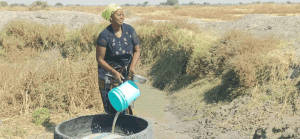 |
|
| A woman fetching water from the source during dry season | |
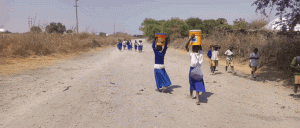 |
|
| School girls carrying buckets of water during pilot session | |
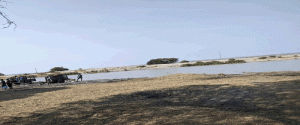 |
|
| Water sources found in Kishapu district about 20 kilometers away from households | |
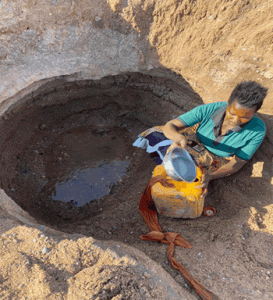 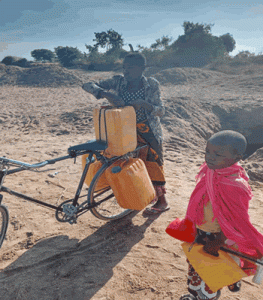 |
|
| Women struggling to fetch and carry water from the sources far from home | |
 |
|
| Poor quality of water fetched from water sources in Kishapu district | |
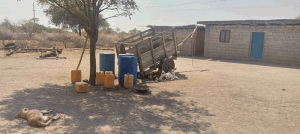 |
|
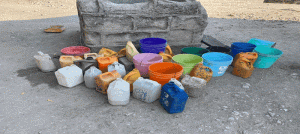 |
|
| Cart, drums and other containers (small to large ones) for transporting water from sources | |
Evidence through the photos Useful links: https://idrc-crdi.ca/en/project/scaling-innovations-reducing-and-redistributing-womens-and-girls-unpaid-care-work-rural
Work lab: Transition from education to employment for young women in Tanzania
Partnership with CHR Michelsen Institute (CMI) of Norway.
In a world where jobs are scarce and highly competitive, research indicates that employment can provide a direct route out of poverty. Job creation is therefore essential to achieving several Sustainable Development Goals. However, many jobs fail to offer wages and working conditions that support productivity growth and poverty reduction. Poor management practices, including bullying and sexual harassment, have been identified as significant determinants of workplace climate, with women being the most affected victims. The Work Lab project aims to address issues of job search and employment challenges faced by young women using an experimental approach.
The overarching objective of the project is to improve the understanding of the challenges facing young women entering the labor market and to test the effectiveness of a training intervention aimed at enhancing their job readiness. The project specifically focuses on harassment in the workplace, including sexual harassment, and strategies to reduce the associated risks.
The project will involve approximately 400 Form IV students in an urban setting who have just completed their education. It targets students who do not have the grades from national exams to continue with higher education, and are therefore likely to start looking for jobs after finishing Form IV.
The findings from this research will be valuable not only for job seekers but also for employers and policymakers. They will gain a better understanding of how to attract workers, reduce labor turnover, and improve productivity.
Timeframe: 2023- 2024
Completed Projects
Policy Review and Gap Analysis for Circular Food Systems in Tanzania
Funded by FANRPAN
As part of a larger project on Circular Food Systems (CFS) in Africa, ESRF and other researchers in Tanzania are working to understand how to create a closed-loop agricultural system that integrates irrigation, dryland farming, and livestock.
The work involves local communities through workshops to identify opportunities for small businesses to add value to agricultural products and reduce waste. Among other thing, the team will assess the social, economic, and environmental benefits of CFS.
This research is expected to contribute to the discourse of how to improve food security, create jobs, and empower women and youth in Tanzania.
Timeframe: 2023 to 2024
Work Skills for Life: The Work Readiness Program to Prepare the Transition from Secondary Schools
Partnership with the Norwegian School of Economics (NHH)
The study investigates a program to help Tanzanian teenagers land jobs after high school.
The program, called Work Readiness Training (WRP), teaches valuable skills like teamwork and punctuality through extracurricular activities. Researchers will compare schools with WRP to regular schools and schools with an added twist: role models from the community will visit and share their career experiences to inspire students.
The goal is to see if WRP, and especially WRP with role models, helps teens find jobs and feel good about their futures. Beyond assessing the impact and viability of the intervention the study will also look at how much the program costs and how well it is delivered by teachers.
Timeframe: 2022 to 2024
Conducting a realist evaluation of Connect- A project connecting first-time mothers to postpartum family planning through sustainable approaches
Funded by Save the Children Tanzania
The research objective is to evaluate the effectiveness of the Save the Children’s “Connect” program in increasing postpartum family planning use among first-time parents (15-24 years old) in Tanzania.
The project leverages existing health and nutrition initiatives to reach this target group and aims to identify the mechanisms through which the program works in different contexts. This will be achieved through a realist evaluation approach using qualitative methods like interviews and focus groups. The research also focuses on understanding the scale-up process of the program and how it can be adapted to different settings.
Timeframe: 2023 to 2024
Empowering Women Owned Businesses through Public Procurement in Tanzania
Partnership with WSP and REPOA, and funded by IDRC
The project aims to promote the participation of women-led businesses in public procurement by developing policy guidelines that governments can adopt and by identifying innovative and inclusive policy interventions which can be scaled in Tanzania.
The project will work closely with selected government actors, the private sector and civil society organizations to develop and scale innovative policies and interventions that facilitate the implementation of gender-responsive public procurement to address gender segregation in the world of work and foster women’s economic empowerment. It will employ mixed methods for data collection. A randomized control trial evaluation framework will be used to evaluate and scale effective interventions.
This project is supported under the Growth and Economic Opportunities for Women (GrOW) East Africa initiative, jointly funded by the Bill & Melinda Gates Foundation, the William and Flora Hewlett Foundation and IDRC. GrOW East Africa seeks to spur transformative change to advance gender equality in the world of work.
Timeframe: 2022 to 2024
Useful links:
https://idrc-crdi.ca/en/project/empowering-women-owned-businesses-through-public-procurement-tanzania
Research Program Towards Programming, Services and Innovation for Children and Adolescents in Tanzania Cities
In partnership with UNICEF Tanzania
This program aimed at improving the lives of children and adolescents in Tanzanian cities by informing policy and practice. Through research, capacity building and stakeholder engagement, it gathered evidence on children’s issues, inform policy making and put best practices into action.
The program included research on existing data, new thematic research, youth-led action research and knowledge sharing with policymakers and stakeholders.
Timeframe: 2020 to 2021
Knowledge, Attitude and Practice on violence against women and Children
Funded by UNICEF Tanzania
The study aimed to assess the level of existing knowledge, attitudes and practices on VAWC of community members and key stakeholders to provide a baseline and allow a better understanding of the barriers and drivers that hinder efforts to prevent it.
Timeframe: 2021-2022
Situation Assessment and Stakeholders' Mapping of Children living and working in streets in Tanzania and Zanzibar
Funded by SoS Tanzania
To determine the living conditions, challenges, needs, and stakeholder involvement in issues pertaining Children Living and working in streets in Tanzania and Zanzibar
Timeframe: 2022
Documenting the contribution of FEMA clubs to Academic Performance in Tanzania mainland.
Funded by FEMINA
To assess the contribution of FEMA clubs to academic performance in secondary schools, with these clubs.
Timeframe: 2022 to 2023
How to link industrial and social innovation for inclusive development: lessons from tackling cancer care in Africa
In partnership with the Open University of London
The research aims to demonstrate the specific scope for innovative industrial-health collaboration to tackle the emerging crisis of exclusion from cancer care in Tanzania. To demonstrate the benefits for inclusive development of linking local industrial and social innovation in Sub-Saharan Africa (SSA), by addressing the hard case of increasing access to cancer care.
Timeframe: 2019 to 2022
Useful links:
https://link.springer.com/book/10.1007/978-3-031-44123-3
Endline Evaluation Tanzania Development Vision 2025
Funded by the Ministry of Finance (United Republic of Tanzania)
The evaluation aims at getting the feedback from the Tanzanian community of the implementation of the Tanzania Development Plan 2025 since it was launched. The findings are to be used as the inputs in preparation of Tanzania Development Vision 2050.
Timeframe: One-year 2023
Country Review Study
ESRF was commissioned by the African Capacity Building Foundation (ACBF) in 2015 to conduct a Country Review Study. The review is based on a desk study of policies and strategies related to four thematic areas with a view to understanding their adequacy. The thematic areas include: (1) Governance and Justice, (2) Education and Training, (3) Infrastructure Development, and (4) Natural Resource Management. In order to understand how effective they have been implemented and their contributions to desired developmental outcomes, the review process has relied on (a) impact studies undertaken by other stakeholders; and, (b) direct interviews with some key informants in government, private sector, civil society and development partners
The Potential Impact of Sugar- Sweetened Beverages Tax on Obesity Prevalence in Tanzania
The main aim of the study will be to estimate the potential impact of Sugar- Sweetened Beverages (SSBs) tax on obesity prevalence in Tanzania, using a mathematical simulation model, as well as to estimate the government revenue that this tax may generate.
East Africa Youth Inclusion Programme (EAYIP)
ESRF is part of the local implementing partners for this multiyear study (2016-2019) and has already published a numbers of reports that identified and recommended required reforms in national policies, laws and institutions in order to catalyze youth participation and inclusion in economic activities, particularly in agriculture and related value chains. The report was used to prepare numerous types of Policy Briefs targeting policy makers and office bearers at national-level, regional/district and community-level.
Accountability and Corruption Evidence (ACE) Programme
The programme will generate evidence based research on what works to make anti-corruption efforts real. ACE will identify feasible and high-impact anticorruption strategies, tailored to be effective in specific economic, political and social contexts. ESRF has opted to study the procurement pathways under this assignment.
How to link industrial and social innovation for inclusive development: lessons from tackling cancer care in Africa
The research aims to demonstrate the specific scope for innovative industrial-health collaboration to tackle the emerging crisis of exclusion from cancer care in Tanzania. To demonstrate the benefits for inclusive development of linking local industrial and social innovation in Sub-Saharan Africa (SSA), by addressing the “hard case†of increasing access to cancer care.
Promoting Agriculture, Climate and Trade Linkages in the EAC (PACT EAC2)
The PACT EAC2 project, led by CUTS International Geneva in collaboration with CUTS ARC Nairobi, aims to build the capacity of individuals, networks and institutions to identify and promote appropriate policies for climate-aware, trade-oriented, food security enhancing agro-value-addition in the EAC region. ESRF is the implementing partner of this project in Tanzania.
Project Proposal for Small and Medium Enterprises (SMEs) Capacity Building in Tanzania
The project proposal is in response to the African Capacity Building Foundation (ACBF)’s call on funding a pilot SME capacity building project in Tanzania based on direct services to the SMEs in the form of subsidized consulting services. The goal is to enhance the productivity of SMEs and profitability, thereby, contributing to their growth and employment creation.
Assessment of Public and Private Partnership (PPP) in Transport Sector in Tanzania: The Way PPP is Understood, Challenges and the Way Forward
The general objective of this project is to determine the reasons for slow response by private sector to partaking in PPP projects in the transportation infrastructure in Tanzania. Its specific objectives include:
- To assess existing enabling environment to support PPP in transportation infrastructure.
- To examine the understanding of different stakeholders on the concept of PPP in the transportation infrastructure.
- To identify challenges faced by the private sector in partnering with the public sector to invest in transportation infrastructure projects using the PPP approach.
- To identify challenges faced by the government to engage the private sector to invest in transportation infrastructure projects using the PPP approach.
- To draw lessons from other countries on how effective PPP works in the development of the transportation infrastructure.
Independent Partnership on Assessment of the Istanbul Programme of Action for the LDCs (IPOA)
Main Objective
To Inform both developed and developing countries in the world about the implementation status of commitments made in the 2011 Istanbul Programme of Action (IPOA).
The Project started in 2012, Ended 2014
The State of Non Communicable Diseases (NCDs) in Tanzania and Optimal Interventions
The main objective of this study is to assess the current state of NCDs (Diabetes and Cancer), and map the optimal preventive interventions to reduce NCDs prevalence in Tanzania. The team is presently reviewing literature and preparing the reports.
Country Policy and Institutional Assessment (CPIA) Study
The Economic and Social Research Foundation (ESRF) was commissioned by the African Capacity Building Foundation (ACBF) to conduct a Country Policy and Institutional Assessment (CPIA) for Tanzania for the year 2015. The core reference period for this year’s CPIA self-assessment is 2014, though pertinent events of 2015 are also covered in the analysis. The 2015 CPIA report for Tanzania is based on the responses collected in questionnaires which were distributed to 64 institutions in the country. The questionnaire was developed by the ACBF to serve as a self evaluation tool for all the member countries participating in the CPIA study. The CPIA self assessment study normally makes an assessment based on the following thematic areas: Economic Management, Structural Policies, Policies for Social Inclusion/Equity, and Governance. The CPIA report describes the progress Tanzania is making in strengthening the quality of its policies and institutions. It presents CPIA scores reflecting the quality of the country’s policy and institutional frameworks across 16 dimensions, grouped into four clusters.
